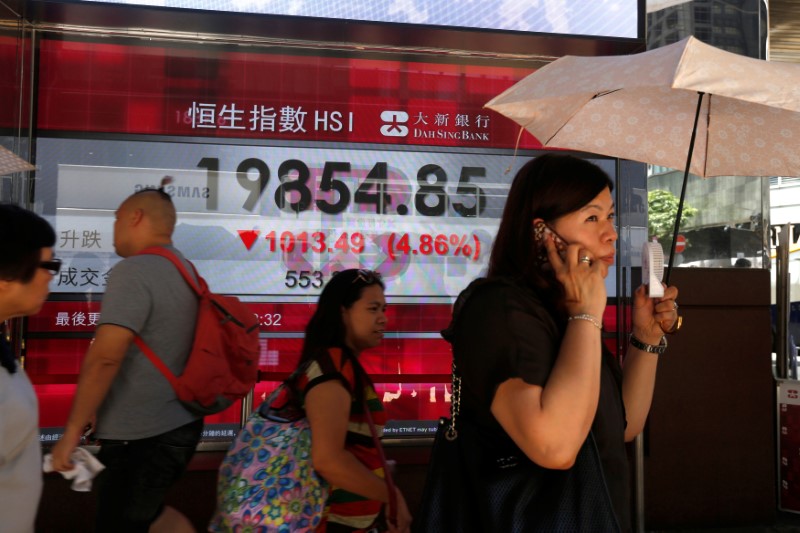Asian shares were on edge on Wednesday as fresh doubts around the timing and extent of a US rate cut this year pushed bond yields to a near four-week peak.
Most markets across the region were in the red, led by the Hang Seng Index, which shed more than 344 points, down 1.83%, to close at a nearly three-weak low at 18,477.
Tech shares were the biggest drag on Hang Seng, led by e-commerce giants Meituan and Alibaba, which were down 5.3% and 3.5%, respectively.
Also on AF: Talk of Auto Deals With China Rises, as EU Tariffs on EVs Loom
Shares of Xiaomi also fell nearly 2% after Poland’s Office of Competition and Consumer Protection said it was investigating possible anti-competitive practices in the sale of the Chinese smartphone-maker’s equipment.
The firm’s shares hit their lowest since May 2 at the start of trade, before paring some losses. Xiaomi Poland said it “adheres to all applicable laws and regulations, and is cooperating fully with authorities to resolve this situation as quickly as possible.”
“No further information is available at this time, due to the ongoing nature of this situation,” it said in a statement.
Overall, the Hang Seng Tech Index ended lower by 2.32%.
Yields weigh on Nikkei
In Japan, the benchmark Nikkei saw relatively smaller losses after the index shed early gains to end 0.77% lower at 38,556.87. The index had risen as much as 0.7% in early trade tracking strong performances of US chip-related stocks, driven by AI darling Nvidia.
A 7% rally in Nvidia shares, which took the AI chips giant to a record high on Tuesday, meant that the company’s stock market value was about $100 billion away from overtaking Apple.
But the tech-driven jubilation for Nikkei was cut-short by soaring US government bond yields, which lifted their global counterparts. Japanese yields hit their highest in more than 12 years at 1.081% — levels last seen in December 2011.
Yields also rose on expectations that the Bank of Japan could soon raise interest rates again, leading nervous investors to sell growth stocks.
Higher yields could hurt growth stocks whose appeal lies in future cash flows, resulting in a dip in utility stocks.
Nuclear power plant operator Tokyo Electric Power Holdings fell 8.3% to become the biggest percentage loser on the Nikkei. Meanwhile, Mitsubishi Electric fell 4.5% and shares of air-conditioning maker Daikin Industries fell 2.3%.
Chip-making equipment maker Tokyo Electron also shed early gains to end 0.3% lower. The broader Topix ended nearly 1% lower at 2,741.62.
Rate cut headache
The jump in US yields came after consumer confidence data came in stronger than expected on Tuesday. The data left investors guessing about the strength of the economy and sticky inflationary pressures, which in turn cloud the outlook for the Fed’s policy path.
“These expectations of Fed rate cuts have been pared back,” said Aneeka Gupta, director of macroeconomic research at WisdomTree. “Overnight we had [Minneapolis Fed President] Neel Kashkari mention that we still can’t take the possibility of a rate hike in 2024 off the table.”
Traders currently put the odds of at least a quarter-point interest rate cut by September at around 44% following the data, from a coin toss a day earlier, according to the CME Group’s FedWatch Tool.
Gupta said the release of US personal consumption expenditure inflation data on Friday will be an important guide for Fed policy. “If we get a slight slowdown come in on Friday that would definitely cement the possibility of a rate cut coming to fruition for September,” Gupta said.
The uncertainty weighed on global equities, with European equities opening lower and US stock futures also in the red.
Election uncertainty weighs on India, China bucks trend
Elsewhere in Asia, Singapore, Taipei, Manila and Bangkok were all in the red. Deep cuts were also seen in Korea’s benchmark index KOSPI and the Jakarta Composite, both of which slumped 1.67% and 1.56% respectively.
Indian benchmarks saw their worst session in nearly three weeks, dragged down by heavyweight financials and tech stocks amid uncertainty around domestic election results.
The blue-chip NSE Nifty 50 closed 0.8% lower at 22,888.15 points as the volatility index hovered near two-year highs amid uncertainty about the margin of victory for the ruling Bharatiya Janata Party. Investors were seen booking profits to wait on the sidelines for the results expected on June 4.
The uncertainty has also led foreign investors to sell about $2.6 billion of Indian equities in May on a net basis so far.
Chinese stocks were the only outliers in Asia on Wednesday, edging up marginally as the International Monetary Fund (IMF) upgraded its economic growth forecasts for the Asian giant.
China’s economy is set to grow 5% this year, after a “strong” first quarter, the IMF said on Wednesday, raising its earlier forecast of 4.6% expansion. China’s blue-chip CSI300 index was up 0.38%.
The largest percentage gainer on the main Shanghai Composite index was Trina Solar, up 10.23%. Also among the top gainers was Shenzhen-listed BYD, which snapped a six-session losing streak with gains of more than 8% on the launch of its new hybrid technology.
Dollar pounds currencies
Meanwhile, higher US bond yields drove the dollar to a four-week peak of 157.4 against the Japanese yen on Wednesday.
The yen, effectively, inched back to levels that led to bouts of likely intervention from Tokyo at the end of April and early May, albeit rising at much slower pace than it did last month.
Easing rate cut expectations also put the brakes on the recent relief rally across most Asian currencies.
The dollar was up 0.09% on the yuan traded offshore at 7.270, while the Indian rupee logged its biggest daily decline against the greenback in nearly seven weeks.
The Indian currency fell 0.2%, its biggest daily fall since April 12. Experts said the decline in the rupee was “exacerbated” by month-end dollar buying by oil importers.
The impending election outcome also created “significant uncertainty” for the rupee, said Sugandha Sachdeva, founder of SS WealthStreet, a New Delhi-based research firm.
Key figures:
Tokyo – Nikkei 225 < DOWN 0.77% at 38,556.87 (close)
Hong Kong – Hang Seng Index < DOWN 1.83% at 18,477.01 (close)
Shanghai – Composite > UP 0.05% at 3,111.02 (close)
London – FTSE 100 < DOWN 0.53% at 8,210.48 (1230 GMT)
New York – Dow < DOWN 0.55% at 38,852.86 (Monday close)
- Reuters, with additional editing by Vishakha Saxena
























